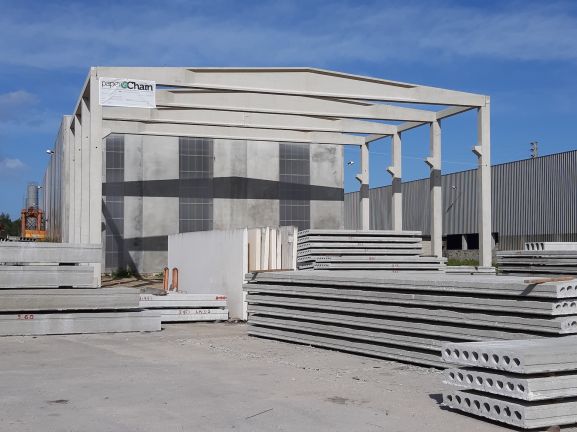An industrial building made of pre-fabricated concrete and a paved road section in Aveiro (Portugal) are the pioneering test cases
TECNALIA uses waste from the production of pulp and cellulose (lime mud, green liquor dregs (GLDs) and slaker grits) and industrial process waste as secondary raw materials in the construction sector, based on the principles of the circular economy.
The paperChain initiative includes 20 partners in five European Union countries committed to promoting circularity. In Portugal, the organisations involved are the University of Aveiro, The Navigator Company, Spral, Megavia, RAIZ Research Institute and the Sustainable Habitat Cluster.
Our Building Technologies team is collaborating in the analysis of “new market niches for paper and cellulose industry waste based on circular economy strategies”, among other tasks; Acciona Construcción (Spain) is coordinating the initiative.
The case study involved developing two types of construction products.
New pre-fabricated concretes
The first instance of the application of circularity in Portugal, within the scope of the paperChain project, focuses on the use of carbonate sludge as filler in the dosing of pre-fabricated concrete (beams and columns). These construction elements were used in an industrial building in Ílhavo, at SPRAL's facilities. Their structure will be monitored over the long term.
New aggregates in the construction of road layers
This case study consists of a 250 m stretch of road with a total area of 2800 m². A reference (standard) bituminous mix was extended for comparison with two different mixes containing GLDs and grits in the final formulation, after these waste products were treated, deemed suitable and selected by Dilumex. This stretch of road will be monitored until February 2021.
GLDs and grits are used as fine aggregates and fillers in the surface layer of bituminous roads: they are implemented in the facilities of The Navigator Company paper mill in Cacia (Aveiro).
PaperChain is a project funded by the European Commission (H2020 research and innovation programme), aimed at contributing to the zero-waste goal, and at demonstrating and implementing the circular economy concept in new business models.
The use of this specific waste will help to reduce its current disposal in landfills and minimise costs. It will also have other associated benefits, such as reducing CO2 emissions through the replacement of natural raw materials, filler materials and fine aggregates.
The results could be replicated in other areas of the EU. There is a significant paper industry in the Basque Country which minimises its carbon footprint and waste, and creates new value and business opportunities.
Further information
Contact our colleague Asier Oleaga, researcher in the area of cement-based products.

